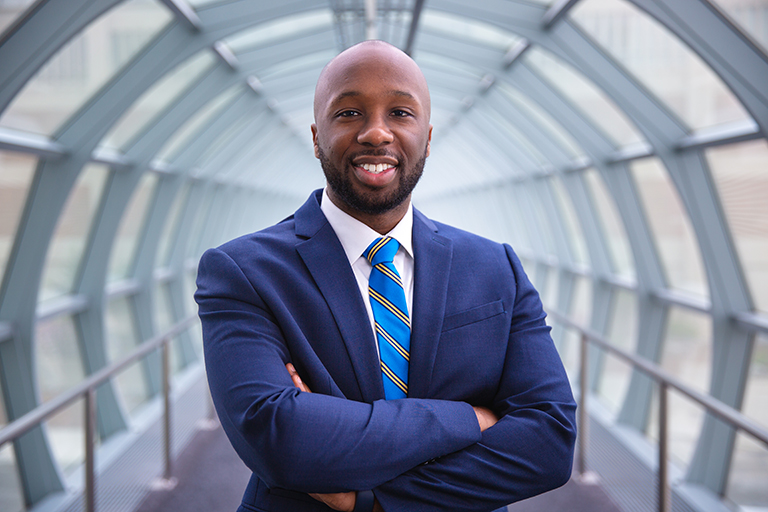As a biochemical engineer with experience in research and development, Jonathan Jones, MBA’20, understands business is integral to the science field.
“In R&D, you can think of each laboratory as a startup: We’re all competing for a piece of the pie in the next new idea, and those who have business acumen can often better communicate the value of their ideas,” he said. “It’s not just about coming up with a cool or novel innovation. Very few ideas developed actually transfer into business value as a new product. So how does a scientist or engineer convince business people his or her idea is worth investing in?”
Jonathan began working in the fermentation manufacturing industry upon earning his undergraduate degree from the University of Georgia. Following his manufacturing role at Dow Agrosciences, Jonathan moved into R&D and realized he wanted to know more about the business as a whole.
“I didn’t truly understand how business decisions were made and how that knowledge interfaced with the technical knowledge I had already as an engineer,” he explained. “I decided to earn an MBA, but I didn’t want to forgo my salary. I also wanted to apply what I was learning directly to what I was doing at work while I was learning it.”

Jonathan found that the Kelley School of Business Evening MBA Program allowed him to work during the day and attend classes in the evening in downtown Indianapolis, just a few blocks from his apartment.
“I was learning how to integrate classical engineering training with operational strategies for successful execution at any level, allowing me to deliver results on the job,” he said. “That got me noticed by my superiors, and I was offered a new opportunity.”
Jonathan now works in the project management group at Corteva Agriscience™ as a manufacturing representative. He serves as liaison between the business, project team and manufacturing facilities to ensure that the capital projects are executed and delivered as expected.
“The job I have now integrates all the pieces I’ve learned to ensure people work together toward a deliberate solution. It’s a skill I continue to develop,” he stated. “I received some project management training from my Six Sigma Project Leader certification, but this is different because I am beginning to understand that I cannot solve everything through data analysis. The methods I gained at Kelley had a very large part to play in the role I have now. I have the confidence to work with any person, at any level, any time.”
Among the courses that made the greatest impact on Jonathan was a marketing class that zeroed in on his purpose for pursing an MBA. As an engineer, he was comfortable with decisions based on and supported by numbers. However, humans often make irrational decisions. He learned how senior leaders may make decisions influenced by experiential and relational knowledge. Using what he learned from this course, Jonathan successfully launched a cross-functional tool to transfer information from R&D that helped his team fast-track concepts to manufacturing.
“That class really taught me about varying stakeholders, understanding their individual perceptions and how those perceptions drive their decisions,” he said. “It’s about the relationships people have, and that’s what you learn in the MBA. In engineering, we learn how to solve problems, but we often think of solutions just in terms of numbers and logic. But our society is built on illogical decisions. As future managers, we have to begin to communicate beyond the boundaries of our individual biases to deliver the best solution to market.”
Jonathan said the hands-on, experiential learning gained through career panels, business management simulations and business consulting projects in the Kelley Evening MBA Program helped him develop a different level of skill than he’d had previously.
“In engineering, you use high-level technical knowledge to solve complex problems. As an MBA, you solve very complex problems by devising and executing a strategic plan. Those initially seemed like the same thing to me, but Kelley taught me it’s more than just numbers; the assimilation of information and execution strategy is important,” he said. “If you’re trying to make a move as a technically competent person to become strategic and business savvy, the Kelley Evening MBA will help you earn those skills and apply them immediately.”

“Coupling a technical background with a business background makes you a force to be reckoned with. You can sit in that intersection and leverage the strengths of both to bridge the communication gap between functions.”
Jonathan has thrived under the combination of business and engineering, and he’s paying it forward. In 2018, he received the Eugene M. DeLoatch Legacy Award at the Black Engineer of the Year Awards in Washington D.C. and was a member of the University of Georgia 40 Under 40 class in recognition of his leadership and involvement in a company-sponsored STEM outreach program. Jonathan started the local chapter in Harbor Beach, Michigan, when he worked there as an engineer, and has gone on to serve on the global steering team at the Indianapolis Global Business Center.
“I was only doing what my teachers did for me while I was growing up,” he said. “To know our program has impacted hundreds of thousands of people around the world in such a short span is very meaningful to me.”
Jonathan is also using his Kelley MBA to excel at Corteva, and he plans to use his newly obtained knowledge to pursue a business role in the company in the future.
“The Kelley Evening MBA taught me to devise a plan and start having conversations with leaders to realize that plan,” he said. “This MBA is opening doors for those conversations because I’m no longer just an engineer. When people understand that you can effectively manage your time and successfully deliver on the job, opportunities open up.”
Leave a Reply